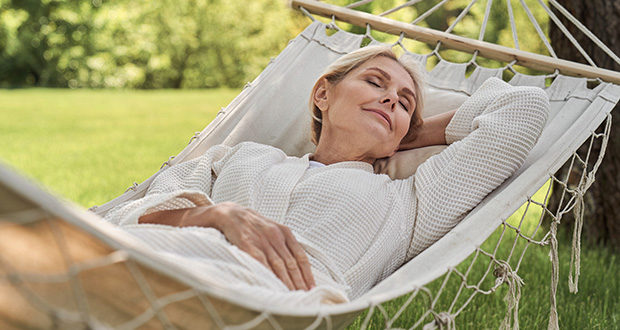New research confirms our daily sleep habits, age and lifestyle determines our risk of Alzheimer's in the future.
The Australian-first study used acoustic stimulation technology to enhance slow wave sleep in older people to boost the clearance of toxins in the brain associated with the disease.
Slow wave sleep, a very deep state of sleep, improves memory consolidation and removes harmful byproducts from the brain.
"Slow wave sleep is key in clearing amyloid every night," associate professor Clare Anderson from Monash University says.
"During the day, when we're using our brain, it creates different byproducts.
"Some of those are good, and some of those are not so good.
"And one that's not so good is amyloid-beta peptide."
Alzheimer's is one of the long-term neurodegenerative diseases under the umbrella term dementia.
Although dementia is common – 1 in 15 Australians over 65 are affected – it's not considered a normal part of ageing.
Research focuses on the protein amyloid-beta peptide, an off-script version of its predecessor, which can clump together and form plaques that disrupt the communication between nerve cells.
While it's normal for a healthy brain to have some levels of amyloid as it's essential in neural growth and repair, an excess of amyloid is harmful.
"When that happens, it initiates this cascade of brain changes towards a disease like dementia," Anderson says.
"At the moment, we don't know whether that's because people with Alzheimer's produce too much or whether it's not cleared sufficiently by the brain.
"So we're trying to promote the clearance of amyloid during sleep, using slow waves to stave off or delay any of those brain changes that are the beginning of Alzheimer's."
The problem is that slow wave sleep significantly lessens as we age.
About 20 per cent of a 20-year-old's sleep consists of slow wave, whereas someone at age 60 only has 4 to 5 per cent.
"We're seeing slow wave sleep decrease by 2 to 3 per cent per decade," Anderson says.
"As we lose this type of sleepwaves, we're also losing the capacity to have a good and strong memory and brain health.
"So we're attempting to restore slow wave sleep to when we were in our 20s and 30s."
Similar to rocking a baby to sleep, adults can promote this type of brainwave by rhythmically falling asleep.
"But rocking yourself to sleep in, for example, a hammock, is not something everyone has daily access to, so we're using an acoustic simulation approach."
When someone starts to show slow waves during sleep, the technology delivers a quiet but audible tone which enhances the wave.
The tone triggers the waveform to become stronger and produce more similar waveforms.
"During this phase, the brain is most receptive to stimulation," Anderson says.
"For every slow wave an older person has, we boost it, and then we create more, so they'll have the same waveform as somebody much younger."
Anderson's research is backed by a rising number of global studies confirming slow wave sleep as a promising prevention method against Alzheimer's.
The United States already has devices on the market, such as Philip's EEG-based wearable headband that also uses sound.
But Anderson emphasises that we don't need to rely on technology to promote slow wave sleep.
"Being active, performing cognitive tasks, staying socially engaged and learning new things have the same effect," she says.
"The more you use your brain during the day, the more slow wave sleep you'll have at night."
Her research, 'Sleep, Circadian and Ageing', was recently awarded Faye Williams Innovation Grant funding worth $375,000.
Anderson hopes the program will prove the significance of sleep in preventing dementia.
"By the end of the study, I'd like to know whether deep wave sleep is only preventative or if it also works when someone already has amyloid build-up," she says.
"We know that around 50% of the risk of Alzheimer's is due to modifiable risk factors.
"There are nine very clear modifiable risk factors, and I strongly believe sleep is the 10th one."
Do you have an idea for a story?Email [email protected]
 Aged Care Insite Australia's number one aged care news source
Aged Care Insite Australia's number one aged care news source


There are a lot of studies going on & I’m just wondering, I have sleep apnea & use a CPAP machine. Has there been any studies on the brain through having more oxygen in the blood stream? Would this help decrease the chance of getting dementia? I’m now averaging 6 hrs sleep a night with only about on average 2 interruptions a night.
Just a thought.